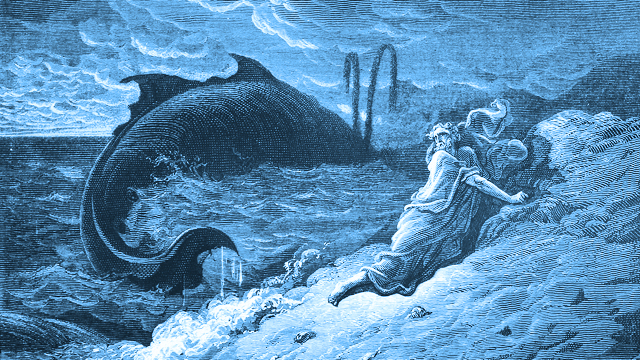
Once upon a time, there was a prophet named Jonah. God told Jonah to warn the people of Nineveh that they were headed for destruction if they continued their selfish ways. But Jonah was a rebellious young lad. After hearing God’s command, he foolishly ran in the other direction, hopped on a boat, and sailed off to sea. The Creator sent a raging storm after him and when the sailors on the boat realized that Jonah was to blame, they threw him overboard.
Along came a great fish that swallowed him up whole. Jonah spent three days sitting in the belly of the great fish immersed in two things that can bring about the deepest transformation: darkness and solitude.
The story of Jonah is traditionally told on Yom Kippur, a day when we face the darkness within and examine all of our negative actions and habits. By taking account of every hurt we’ve ever inflicted upon another, every transgression, every selfish act (whether intentional or unintentional) we open ourselves up to blessings. If we do not reflect upon our negative ways, we cannot transform.
Yom Kippur is our opportunity to broaden our consciousness and take in enough Light to get us through the year ahead. The size of our “vessel” on Yom Kippur determines how much Light will be able to enter. How do we expand in order to take in as much Light as possible? Through the act of cleansing.
Yom Kippur allows us to be born anew. Michael Berg explains in Days of Connection, “Like a mikveh (spiritual cleansing bath), Yom Kippur is an immersion that can completely remove every attachment of negativity. But the negativity can be released only if we are completely immersed.” This means a thorough examination of ourselves is necessary. Half-hearted attempts cannot cleanse us. By completely eradicating all Desire to Receive for the Self Alone, we can be cleansed and ready for the Light. The Zohar says that those negative actions that we remember will be forgotten on Yom Kippur and those that we forget will be remembered. It is our best interest to recall and weed out every single aspect of ourselves that we desire to change.
During Jonah’s time in the belly of the fish, deep under the surface of the ocean, he is able to reflect upon his less-than righteous acts. Three days thinking about his negative actions cleanses him, like submerging in a mikveh or Yom Kippur. Rav Berg elaborates on the importance of solitary reflection as an important component of the cleansing process in his book, Days of Power, “One of the easiest ways to nullify the Desire to Receive for the Self Alone is to sit quietly for a moment and isolate the specific desire that caused any accident, sorrow, or suffering we have inflicted on others. Responsibility must be taken for events, and we must decide to prevent their recurrence by destroying and canceling the desire that caused them. The moment we make this decision, we attain an alternate level of consciousness.” When Jonah achieves this level of consciousness, he is finally released. The great fish spits him out on shore and Jonah is reborn. He is able to take up the original task God had given him—inspiring the people of Nineveh to repent and live a better life. The true miracle of the story (even greater than Jonah’s survival) is when the town listens to Jonah’s message. The king orders everyone to “turn back from his evil ways and from the injustice of which he is guilty” (3:6-8). The commitment of the entire township so impresses the Creator that he renounces the punishment He had planned and leaves Nineveh in peace.
True transformation is possible for every soul that commits to deep contemplation and cleansing on Yom Kippur. Each of us is Jonah on Yom Kippur entering the depths of our negativity, the darkest corners of our consciousness, boldly going beyond what could be the point of no return. But we do return. In the desire to let go of negativity and bad habits, each of us can transform in the most beautiful way. If Jonah’s prayers could be heard from the belly of a whale, so can ours.
“This is the gift given to us on Yom Kippur—not religiosity, but an opportunity to increase and improve the spiritual and physical quality of life of all human beings.” - Rav Berg
